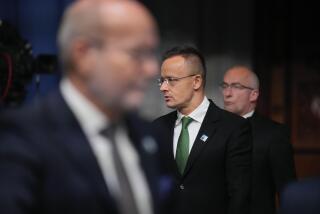Bush May Curb Programs With Soviets : Baltics: Official says U.S. is reviewing both substantive and symbolic steps. The European Community threatens to cut off aid to Moscow.
WASHINGTON — In its toughest and most explicit policy statement on the violent Soviet crackdown in the three Baltic states, the Bush Administration said Thursday that it is considering curtailing “the whole range of programs of cooperation with the Soviet Union” if Moscow’s repression intensifies.
Similarly, at a meeting in Paris, the European Community threatened Thursday to cut off all Soviet aid, including emergency food supplies, if Moscow keeps repressing the Baltic republics.
In Washington, Assistant Secretary of State Raymond Seitz said the United States is considering both substantive and symbolic steps. Officials said Seitz’s statement reflected growing apprehension, based on troop movements, that further Soviet military action in the Baltic states might be imminent, as well as an assessment that the future of President Mikhail S. Gorbachev and the course of Soviet politics and national policy are at an important turning point.
“We are outraged by the killing of unarmed civilians in Vilnius by Soviet military units on Jan. 13,” Seitz said in testimony to a special hearing of the Congressional Helsinki Commission.
Seitz gave no details of the specific U.S. programs for the Soviet Union under review because of the Baltic developments but said they include “programs in the commercial and financial areas.”
Two former members of Gorbachev’s Cabinet and several officials and intellectuals who had long supported the Soviet leader published a declaration Thursday in the liberal Moscow News calling the leadership “criminal.”
“Now when the regime’s final hours are near, it has joined the decisive battle by blocking economic reform, reanimating censorship of the press and television and supporting ugly demagogic language,” the front page statement said. “And most important, the regime has declared war on the republics.”
Also on Thursday, the Soviet Union rejected a proposal backed by the United States, Canada and European countries for an international conference on the Kremlin’s crackdown in the Baltics, diplomats said.
The move underscored Moscow’s resolve to oppose any international recognition of the independence-seeking Baltic states, which were incorporated by force into the Soviet Union in 1940 after being independent between World War I and World War II.
In Paris, Luxembourg Foreign Minister Jacques Poos, whose country holds the EC’s rotating presidency, said: “All forms of aid will be suspended if repression and the use of force continues or gets worse.”
European Community aid to the Soviet Union includes a $1-billion emergency food aid package and a $500-million technical assistance package for 1991.
In the Soviet Union, the Kremlin promised Thursday not to seize the Lithuanian Parliament building, but wary Baltic residents said they feared a crackdown while the world watches the Persian Gulf war.
Both of Lithuania’s Baltic neighbors, Latvia and Estonia, were reported calm Thursday. The official Tass news agency said the Soviet military and Estonian officials had reached agreement on the contentious issue of conscripting Estonian youths into military service.
But the Lithuanian Parliament said that Soviet soldiers “began a violent, mass hunt for youths” dodging army service and captured 11 young men in the capital of Vilnius.
The reported clampdown on draft dodgers in Vilnius started several hours after Gorbachev’s personal envoy to Lithuania told the local legislature that he had come to the Baltic republic to seek peace.
Lithuanian television began broadcasting for the first time since Sunday’s military crackdown in Vilnius, but the airwaves were controlled by the National Salvation Committee, a shadowy group of Communists loyal to Moscow. Soviet troops captured the republic’s television center in the bloody attack that left 14 people dead.
In Warsaw, Polish President Lech Walesa’s spokesman said Thursday that Moscow has stiffened its stand on the withdrawal of Soviet troops from Poland and fears are that the Soviet military may attempt to retrieve Eastern Europe as the war in the Persian Gulf is under way.
Andrzej Drzycimski, during a news conference in Belvedere Palace where Walesa has its office, said Poland’s negotiations with Moscow on the withdrawal of some 50,000 Soviet troops from the country are stalemated.
He linked it with the war in the gulf and the situation in the breakaway republic of Lithuania, Poland’s northeastern neighbor.
More to Read
Sign up for Essential California
The most important California stories and recommendations in your inbox every morning.
You may occasionally receive promotional content from the Los Angeles Times.










